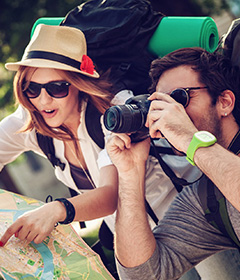Travelling to experience global festivals offers a unique opportunity to immerse oneself in diverse cultures, traditions, and celebrations. These vibrant events provide a window into the heart of a community, allowing travellers to create lasting memories and gain a deeper understanding of the world around them. From the colourful streets of Rio during Carnival to the serene water rituals of Songkran in Thailand, festival travel opens doors to unforgettable experiences and cultural connections.
Cultural immersion through global festival participation
Participating in global festivals offers a level of cultural immersion that few other travel experiences can match. By joining in local celebrations, travellers can gain authentic insights into a community’s values, beliefs, and way of life. These events often showcase traditional music, dance, cuisine, and customs, providing a multisensory experience that goes beyond typical tourist attractions.
Festival participation allows you to engage with locals on a more personal level, fostering meaningful connections and breaking down cultural barriers. Whether you’re dancing alongside samba performers in Brazil or sharing a meal with strangers during Oktoberfest, these interactions create memories that last long after the festival ends.
Moreover, many festivals have deep historical or religious significance, offering travellers the chance to learn about a culture’s heritage and spiritual practices. By observing and participating in these events, you can develop a more nuanced understanding of the host country’s social fabric and cultural identity.
Logistical planning for international festival travel
While festival travel can be incredibly rewarding, it requires careful planning and preparation. From securing visas to finding accommodation during peak periods, there are several logistical considerations to keep in mind when embarking on a festival-focused journey.
Visa requirements and entry regulations for major festival destinations
Before booking your trip, research the visa requirements and entry regulations for your chosen festival destination. Some countries may have specific visa categories for festival attendees or implement temporary entry measures during major events. It’s crucial to start the visa application process well in advance, as processing times can be longer during peak travel seasons.
Additionally, be aware of any health requirements, such as vaccinations or COVID-19 related protocols, that may be in place for international travellers. Staying informed about these regulations will help ensure a smooth entry into the country and allow you to focus on enjoying the festival experience.
Accommodation strategies near festival venues: from glamping to homestays
Securing suitable accommodation during major festivals can be challenging, as prices often surge and availability becomes limited. To navigate this, consider alternative options beyond traditional hotels. Glamping sites, for instance, have become increasingly popular at music festivals, offering a comfortable outdoor experience close to the action.
Homestays provide another excellent option, allowing you to stay with local families and gain deeper insights into the culture. This approach not only offers a more authentic experience but can also be more budget-friendly. Platforms like Airbnb and Couchsurfing can be valuable resources for finding unique accommodation options during festival periods.
Transportation options: navigating public transit during peak festival periods
Navigating transportation during busy festival periods requires strategic planning. Research the public transit options available in your destination and consider purchasing multi-day passes if they’re offered. Many cities implement special festival transit services, such as shuttle buses to event venues, which can be more convenient than regular public transport.
For larger festivals spread across multiple locations, consider renting a bicycle or scooter to explore more freely. This not only provides flexibility but also allows you to experience the local environment more intimately. Remember to familiarize yourself with local traffic rules and always prioritize safety when using alternative transportation methods.
Budget management: balancing festival tickets with travel expenses
Effectively managing your budget is crucial for a successful festival travel experience. Start by allocating funds for essential expenses such as festival tickets, accommodation, and transportation. Research early-bird ticket options or package deals that may offer savings on combined festival and travel costs.
Consider setting aside a portion of your budget for unexpected expenses or spontaneous activities that may arise during the festival. It’s also wise to research local currency exchange rates and ATM availability to ensure you have access to funds throughout your trip.
Balancing festival enjoyment with budget constraints requires careful planning and prioritization. By allocating resources wisely, you can maximize your festival experience without breaking the bank.
Iconic global festivals and their cultural significance
Understanding the cultural significance of major global festivals enhances the travel experience, allowing you to appreciate the deeper meanings behind the celebrations. Let’s explore some of the world’s most iconic festivals and their importance to local communities.
Carnival in rio de janeiro: samba schools and parade dynamics
Rio’s Carnival is a spectacular display of Brazilian culture, featuring elaborate parades, pulsating samba rhythms, and dazzling costumes. The heart of the celebration lies in the samba schools, community organizations that spend months preparing for their moment in the spotlight at the Sambadrome.
Each samba school represents a specific neighbourhood and competes to be crowned champion of Carnival. The parades are not just entertainment; they’re a form of storytelling, often addressing social issues or celebrating Brazilian history through music, dance, and visual spectacle.
Participating in Carnival allows travellers to witness the passion and dedication of Rio’s communities, as well as experience the infectious joy that permeates the city during this time. Whether joining a street party ( bloco ) or watching the main parade, you’ll be immersed in a celebration that embodies the spirit of Brazil.
Holi in india: colour symbolism and regional celebrations
Holi, the Festival of Colours, is a vibrant celebration of spring, love, and the triumph of good over evil in Hindu tradition. While the throwing of coloured powder and water is the most recognizable aspect of Holi, the festival has deep cultural and religious significance across India.
The colours used in Holi each carry symbolic meaning. For example, red represents love and fertility, while green symbolizes new beginnings. Participating in Holi offers travellers a unique opportunity to engage with Indian culture, fostering a sense of community and joy among strangers and friends alike.
Regional variations of Holi celebrations showcase India’s diverse cultural landscape. In Mathura and Vrindavan, the festival is celebrated for over a week, with unique rituals tied to the legend of Krishna. By experiencing Holi in different parts of India, you can gain insights into the country’s rich tapestry of traditions and beliefs.
Oktoberfest in munich: beer tent traditions and bavarian customs
Oktoberfest, the world’s largest beer festival, is a celebration of Bavarian culture that attracts millions of visitors to Munich each year. While the festival is famous for its beer consumption, it offers much more than just drinking, with a rich history dating back to 1810.
The festival’s beer tents, each with its own unique atmosphere and traditions, are at the heart of the Oktoberfest experience. From the traditional oompah bands playing folk music to the servers carrying multiple Mass (one-litre beer mugs) at once, these tents offer a glimpse into Bavarian hospitality and customs.
Beyond the tents, Oktoberfest features parades, carnival rides, and traditional food stalls. Participating in events like the costume and riflemen’s parade allows travellers to witness the pride Bavarians take in their heritage and the importance of preserving cultural traditions in the modern world.
Songkran in thailand: water rituals and buddhist influences
Songkran, Thailand’s New Year celebration, is known for its jubilant water fights that take place across the country. However, the festival has deep roots in Buddhist traditions and Thai cultural practices.
The water used during Songkran symbolizes purification and the washing away of sins and bad luck from the previous year. Traditionally, water is gently poured over Buddha statues in temples and the hands of elders as a sign of respect and blessing.
Participating in Songkran offers travellers the chance to experience both the playful and spiritual aspects of Thai culture. From joining in the water festivities on the streets to observing quieter rituals at local temples, you can gain a deeper appreciation for the balance between joy and reverence in Thai society.
Photography and documentation techniques for festival experiences
Capturing the essence of global festivals through photography and documentation is an art form in itself. To create lasting memories and share your experiences effectively, consider these techniques:
- Research the festival beforehand to identify key moments and locations for capturing iconic shots
- Experiment with different perspectives and angles to capture unique views of the festivities
- Use a combination of wide-angle shots to capture the scale of events and close-ups to highlight details and emotions
- Consider investing in weather-proof camera gear for festivals involving water or colour powder
- Practice photographing in low-light conditions for evening events and performances
When documenting your festival experiences, go beyond just visual content. Keep a travel journal to record your thoughts, feelings, and interactions with locals. Audio recordings of festival sounds, from music to crowd cheers, can also help bring your memories to life long after the event has ended.
Remember that while documentation is important, it’s equally crucial to be present in the moment and fully immerse yourself in the festival experience.
Sustainable and responsible festival tourism practices
As global festivals attract increasing numbers of international visitors, it’s essential to consider the impact of tourism on local communities and environments. Adopting sustainable and responsible practices ensures that these cultural celebrations can continue to thrive while minimizing negative effects.
Eco-friendly festival gear and zero-waste participation strategies
When preparing for a festival, opt for eco-friendly gear and accessories. Choose reusable water bottles, biodegradable glitter for festivals like Holi, and clothing made from sustainable materials. Some festivals now offer rental services for items like tents and sleeping bags, reducing waste and the need to transport bulky equipment.
During the festival, practice zero-waste strategies by bringing your own reusable cutlery and food containers. Many events now provide recycling and composting stations; familiarize yourself with the local waste management system to dispose of items correctly.
Supporting local economies through authentic festival experiences
One of the most effective ways to practice responsible tourism is by supporting the local economy. Choose locally-owned accommodations and restaurants, and purchase souvenirs directly from artisans or community markets. This approach ensures that your tourism dollars benefit the host community directly.
Participate in festival activities organized by local groups rather than large tour operators whenever possible. This not only provides a more authentic experience but also helps sustain traditional practices and supports community initiatives.
Cultural sensitivity: respecting traditions and avoiding appropriation
When participating in cultural festivals, it’s crucial to approach the experience with respect and an open mind. Research the festival’s significance and any specific customs or dress codes before attending. Be mindful of religious or sacred aspects of the celebration, and follow local guidelines for behaviour and participation.
Avoid cultural appropriation by understanding the context of traditional clothing or symbols. If you’re invited to wear traditional attire, do so respectfully and be open to learning about its significance from locals. Remember that you’re a guest in their celebration, and your role is to observe and participate respectfully rather than to appropriate or modify cultural elements.
Post-festival reflection and memory preservation methods
After the festival ends, take time to reflect on your experiences and the impact they’ve had on your understanding of the culture. Consider creating a digital or physical scrapbook that combines photos, journal entries, and mementos collected during the festival.
Share your experiences with friends and family, not just through social media posts, but through thoughtful discussions about what you learned and how the festival changed your perspective. This process of reflection and sharing can deepen your appreciation for the experience and inspire others to explore cultural celebrations around the world.
Consider ways to stay connected with the festival community, such as following the event’s social media accounts or joining online forums dedicated to festival travel. These connections can provide insights into future events and help you maintain the sense of cultural engagement long after you’ve returned home.
Ultimately, the memories and insights gained from festival travel become part of your personal growth and global understanding. By approaching these experiences with openness, respect, and a commitment to responsible tourism, you can create lasting memories that enrich your life and contribute positively to the communities you visit.


